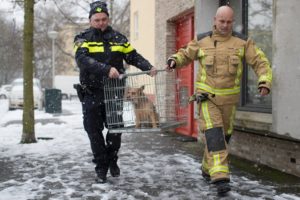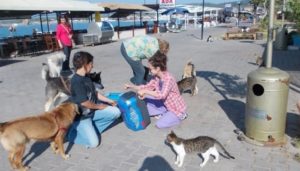Vagrancy is an enormous issue for creatures everywhere throughout the world. There’s no real way to precisely tally what number of stray canines there are But the World Health Organization gauges that around 200 million around the world don’t have a home. Additionally, there’s no genuine simple answer for this issue.

As stray mutts keep on having babies, the world is just unequipped to deal with the sheer deluge of them. Unfortunately, that implies having a home and a family won’t occur for most by far of pups.In the U.S., advocates have thought about how to address the developing stray canine populace, which numerous urban communities just can’t deal with.

“This issue has raised to the point where it would take many years of a concentrated fix program in a city like Houston to start to diminish the numbers,” said Peter Zheutlin, a salvage pooch advocate. “The havens are not regularly high needs for governments either when they have contending requests from the school office, the police office, the local group of fire-fighters, parks, sanitation.

Who represents the dogs?”But incredibly, one nation has broken records, turning into the principal nation on the planet to bring its destitute pooch populace down to zero. Holland was confronting a major test. Its pooch populace had developed exponentially. Owning a canine has been amazingly prominent in Holland since in any event the nineteenth century.

Its connection as a grown-up toy in the long run prompted pretty much every family owning in any event one canine. However, rabies episodes prompted hound possession quickly winding up less mainstream, and numerous proprietors surrendered their mutts in the streets.Dutch authorities in the long run chose the time had come to split down.

They stressed not directly over the potential medical issues that stray creatures can spread, yet additionally about the life, wellbeing, and satisfaction of the pooches themselves. Their initial step? Actualize a nation wide sanitization program. In time, 70 percent of female strays throughout the country were spayed, drastically cutting down on the birth rate. Every dog that was brought it for sterilization was also given a medical exam and brought up-to-date on any vaccinations needed.

This, too, was instrumental in cutting back on the spread of diseases like rabies and parvovirus.After that, the Dutch government passed laws to improve animal rights and protect their health. These laws include punishments for animal abuse and neglect, with perpetrators earning as much as three years in prison and or more than $16,000 in fines.

They also raised taxes on store-bought dogs to encourage adopting rescue dogs from shelters. But that’s not all. Since then, the Dutch have established an animal police force, responsible for investigating animal neglect and rescuing pets from dangerous situations. “Animals — and our entire society — need the animal police,” said Marianne Thieme, leader of the Party for the Animals. “There is a direct link between violence against animals and violence against humans.”

